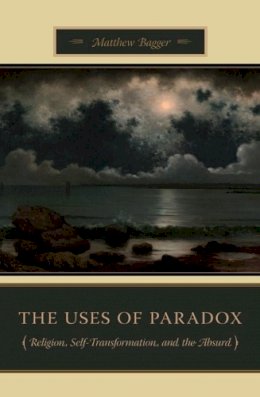
Stock image for illustration purposes only - book cover, edition or condition may vary.
The Uses of Paradox: Religion, Self-Transformation, and the Absurd
Matthew C. Bagger
€ 107.89
FREE Delivery in Ireland
Description for The Uses of Paradox: Religion, Self-Transformation, and the Absurd
Hardback. Investigates the role of paradox in Western and Asian religious discourse. Drawing on both philosophy and social scientific theory, this book offers a naturalistic explanation of religion's oft-noted propensity to sublime paradox and argues that religious thinkers employ intractable paradoxes as basis for various techniques of self-transformation. Num Pages: 152 pages. BIC Classification: HRAB. Category: (P) Professional & Vocational. Dimension: 210 x 140 x 17. Weight in Grams: 363.
In this groundbreaking comparative study, Matthew Bagger investigates the role of paradox in Western and Asian religious discourse. Drawing on both philosophy and social scientific theory, he offers a naturalistic explanation of religion's oft-noted propensity to sublime paradox and argues that religious thinkers employ intractable paradoxes as the basis for various techniques of self-transformation. Considering the writings of Kierkegaard, Pseudo-Dionysus, St. John of the Cross, N?g?rjuna, and Chuang-tzu, among others, Bagger identifies two religious uses of paradox: cognitive asceticism, which wields the psychological discomfort of paradox as an instrument of self-transformation, and mysticism, which seeks to transform the self through an alleged extraordinary cognition that ineffably comprehends paradox. Bagger contrasts these techniques of self-transformation with skepticism, which cultivates the appearance of contradiction in order to divest a person of beliefs altogether. Bagger further contends that a thinker's social attitudes determine his or her response to paradox. Attitudes concerning crossing the boundary of a social group prefigure attitudes concerning supposed truths that lie beyond the boundaries of understanding. Individuals who fear crossing the boundary of their social group and would prohibit them tend to use paradox ascetically, while individuals who find the controlled incorporation of outsiders enriching commonly find paradox revelatory. Although scholars have long noted that religious discourse seems to cultivate and perpetuate paradox, their scholarship tends to ratify religious attitudes toward paradox instead of explaining the unusual reaction paradox provokes. A vital contribution to discussions of mystical experience, The Uses of Paradox reveals how much this experience relies on social attitudes and cosmological speculation.
Product Details
Format
Hardback
Publication date
2007
Publisher
Columbia University Press United States
Number of pages
152
Condition
New
Number of Pages
152
Place of Publication
New York, United States
ISBN
9780231140829
SKU
V9780231140829
Shipping Time
Usually ships in 7 to 11 working days
Ref
99-1
About Matthew C. Bagger
Matthew Bagger is assistant professor of religious studies at Brown University. He has taught at Dartmouth College and Columbia University and is the author of Religious Experience, Justification, and History.
Reviews for The Uses of Paradox: Religion, Self-Transformation, and the Absurd
A major new voice in the philosophy of religion, thoroughly conversant with recent Anglo-American philosophy, but going his own way methodologically.
Nancy Frankenberry, Dartmouth College Refreshing and persuasive... Clearly written, well-argued... Recommended. CHOICE A thought-provoking reading of religious paradoxes.
Forrest Clingerman Religious Studies Review It is worth reading for Bagger's original perspective on some of the religious uses of paradox.
Abigail Turner Lauck Wernicki Journal of Consciousness Studies
Nancy Frankenberry, Dartmouth College Refreshing and persuasive... Clearly written, well-argued... Recommended. CHOICE A thought-provoking reading of religious paradoxes.
Forrest Clingerman Religious Studies Review It is worth reading for Bagger's original perspective on some of the religious uses of paradox.
Abigail Turner Lauck Wernicki Journal of Consciousness Studies
